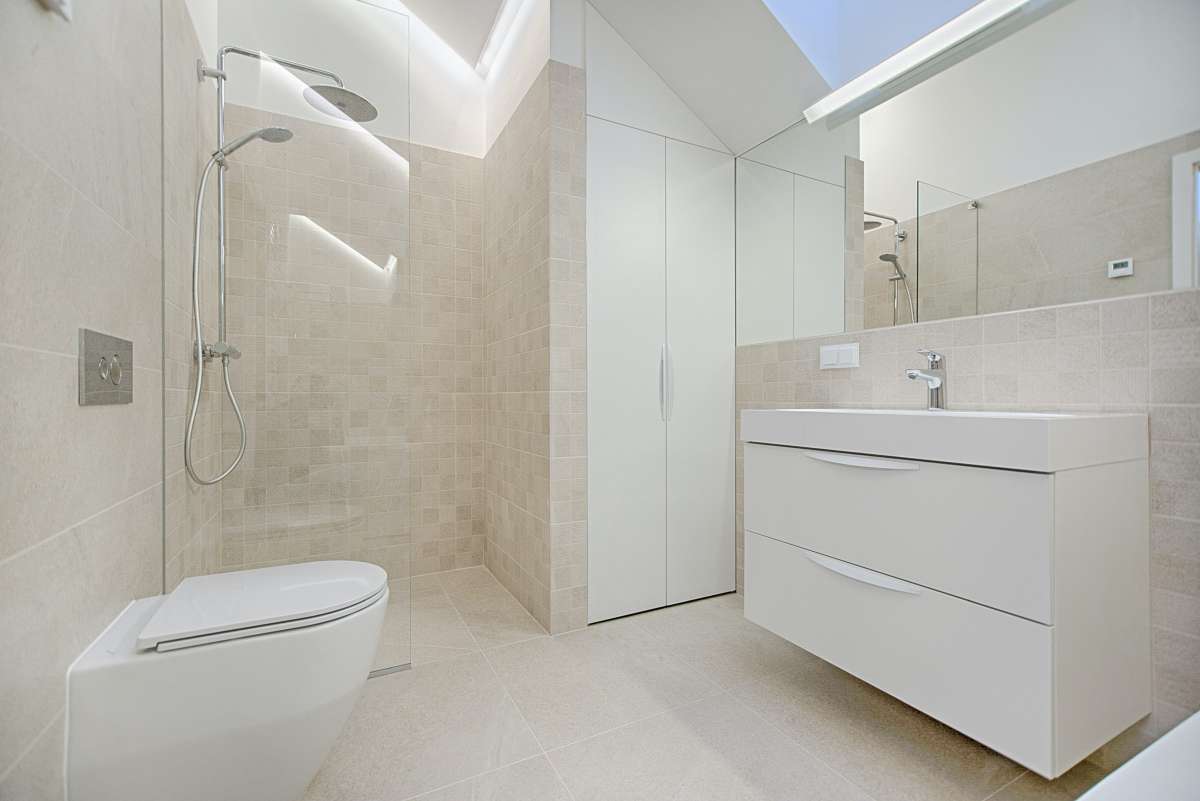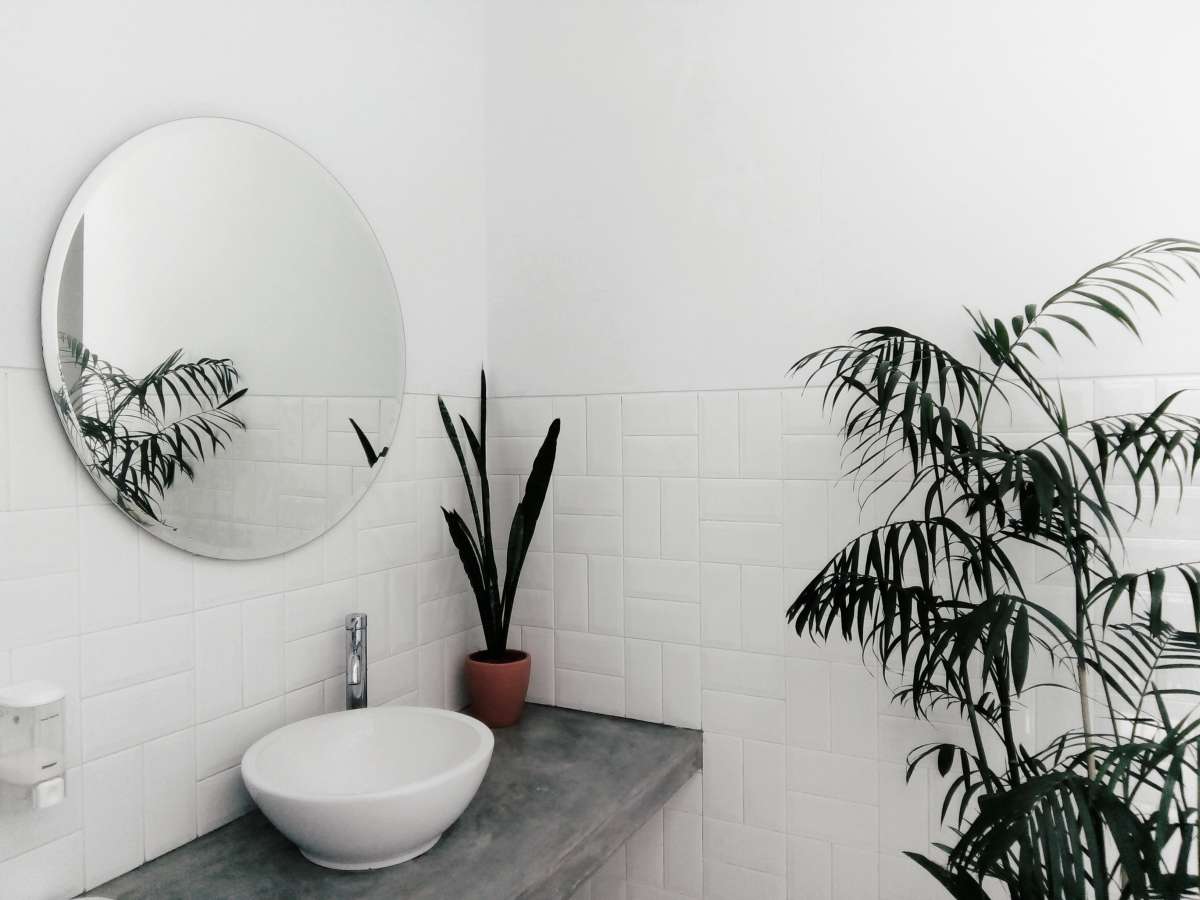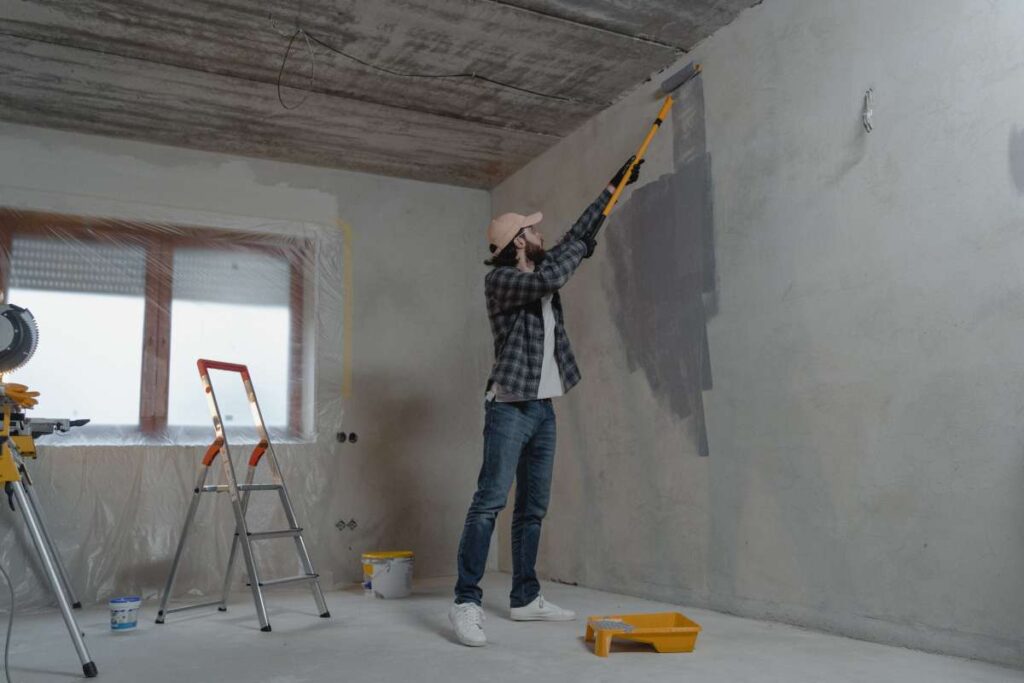The cost of a full-scale remodel of your bathroom by experts can add up quickly. That's why lots of folks these days would rather save cash and do it themselves.
Leave Certain Tasks To The Professionals.
Not even the most determined do-it-yourselfer can do a whole bathroom remodel on their own. There are certainly DIY tasks you can do, but before you tackle any of the following, you may want to consider giving a pro a call.
Time
DIYers can save money, but it's a harsh reality that they take longer to complete the project than professionals.
Hiring experts can save you a tremendous amount of time, potentially weeks or months.
Careful renovation of a second bathroom could take a busy homeowner up to six months to fit into their busy schedule. But, a contractor & his team can transform the identical bathroom into a showpiece in only a few weeks.
Seeing expert remodelers at work on your bathroom will make your head spin. Then you can forget about taking a morning shower.
Workers arrive, and you must attend to business. You go back to your house. Somebody turn on the shower.
The Bottom Line:
Professional help is recommended if your home has only one bathroom. If you have access to the a full bathroom and also can manage without the first for a while, then DIY may be the way to go.
Framing
The fundamental carpentry labour of erecting walls, forming alcoves for showers and tubs, and setting up vapour and insulation barriers is not very challenging.
This is a job that most do-it-yourselfers can handle, albeit it requires paying close attention to the manufacturer's instructions for your fixtures and cabinets.
When it came to framing, accuracy is key.
The Bottom Line:
Try your hand at it if you're handy with a hammer.
Surfaces Of The walls
Professional drywallers, assuming they are any good, will almost always leave you with perfectly smooth walls in the bathroom.
Even the most meticulous homeowner may inevitably encounter imperfections.
When compared to hanging regular drywall, installing green boards designed to withstand moisture is a breeze.
The homeowner cannot compete with a drywall professional that undertakes mudding and sanding on a daily basis.
You can save a little money by hanging & finishing your own if you don't mind a few imperfections.
The Bottom Line:
Expert drywall installation, taping, and mudding may be worth the little price tag. But, those who want to do the work themselves can save a few dollars in the process.
Countertops And Cabinets

The most obvious benefit of hiring professionals to put in your cabinets and counters is the time and effort saved.
You won't be able to mount the cabinets as quickly or as easily as a professional staff of a few individuals.
Yet, bathrooms often have fewer storage options and shorter countertops. So, you will likely be purchasing a vanities unit of a specified width that you're able to easily manage on your own for the smaller bathrooms.
In many cases, the tops for the vanities are already included.
The Bottom Line:
Do it yourself projects like this one are possible for homeowners. Homeowners won't benefit much from hiring a professional to install cabinets and counters, with the exception of very big bathrooms.
Work In The Electrical Industry
Homeowners are not allowed to perform electrical work on their own in several jurisdictions. A fire or electrocution can result from poorly done electrical work.
If you mess up, it will cost a lot to have an electrician fix it.
A licenced specialist should be consulted for the safe replacement of light fixtures and switches; you can get one from a contractor you know, a friend, or a family member.
Waterproofing
DIY tiling projects exist, but Yaqub warns that it's best to leave the work in the bathroom's wet areas to the professionals.
Waterproofing the tile work around a bathtub or shower is an art form in itself.
If you mess up, it might have serious consequences. Instead, hire a professional who is certified to perform such tasks.
Structural Alterations
Taking an sledgehammer to either a wall may seem like a good idea at the time, but it can do serious structural damage to your home if you aren't careful.
If you are unsure as to whether or not a wall is load-bearing, it is best to contact a general contractor for assistance.
Where DIY Can Save You Money
To save money, try your hand at a few easy bathroom renovation chores.
Easily saving you over a thousand dollars in labour costs, a simple vanity, tap, and toilet swap may give your bathroom an instant facelift.
If you know your way around a hammer and power drill, you can handle these tasks without assistance.
These adjustments, however slight they may seem, can have a significant impact in the restricted space.
Refinish The Vanity
A new coat of paint may breathe new life into an old vanity. The room will look larger and the vanity would look brand new if painted a contemporary neutral.
As a starting point for your bathroom renovation, consider using one of these recommended neutral colours for your vanity:
Colour Inspiration:
- Sherwin-Williams Alabaster is a classic white with a warm undertone.
- Benjamin White African Grey is a soothing natural grey.
- Benjamin Moore Platinum Gray, a soothing splash of colour.
How to Approach the Task at Hand
- Before disassembling the vanity, please take pictures of it in its complete state.
- To safely remove screws and other hardware from cabinets and drawers, turn the screwdriver anticlockwise.
- Start by using water & dish soap to clean the surfaces. Afterwards, spray a solution of water and bleach on the affected area to kill the mould and mildew.
- Repair any damage using a putty knife and wood filler.
- Use 120–220 grit sandpaper to lightly sand the vanity, doors, and cabinets.
- Use rollers and brushes to cover the countertop, cabinets, and drawers in paint. Once the paint has dried overnight, you can lightly sand it again.
- Put on another paint job and leave it to dry over the night.
- Drawers and cabinets should be reinstalled in the same manner as they were taken apart before painting. Go back at the starting photos you used as a guide to make sure everything is proper.
Refinish Vinyl Floors
A new coat of paint is an easy way to update a bathroom that is tiled with vinyl that has seen better days.
The key is in the preparation; the paint will only stay put if you clean and sand the floor sufficiently first.
Protect the baseboards, the bathroom fixtures, and the cabinets with painter's tape.
Might the paint itself not be of lower quality?
Porch, flooring, and patio areas are best painted with a latex paint. To prevent the bathroom from appearing cluttered, pick any of the following colours:
- Glossy Light Gray by Valspar
- Valspar Satin White
- Satin Light Gray by Valspar
One coat of primer, then two of the finish colour, is recommended.
Be patient while making sure house floor is properly covered to prevent future nicks or chips with this less time-consuming than skill-challenging project.
Glass Shower Doors Must Be Removed
Removing folding frosted glass shower doors, which may make a bathroom appear outmoded and cramped, is simpler than it may seem.
The first step is to get the shower doors out of the track, which is usually done by lifting them.
Then, turn the exposed screws in the frame anticlockwise with a screwdriver to remove them.
After taking out the screws, the frame was only held together by the caulk. Use a knife or even other sharp blade to carefully cut thru the caulk.
To prevent scratching the tile, make your cuts parallel to the caulk as well as the wall or tub. Be warned, you will spend some time scraping the excess caulk off the tub & walls.
After scrubbing away old caulk and filling in any screw holes, you may hang a regular rod and a shower curtain with a contemporary print.
Improve The Look Of Your Grout
Make your bathroom floor look brand new by painting the grout a dazzling white to cover up years of filth and grime.
It's as simple as painting the pattern in the spaces between the grout lines after you've cleaned the floor tiles.
If you get outside the lines, simply use a sponge to remove the extra colour from the tile. Changing the grout in your bathroom to a stark white will give it a luxurious, upscale feel.
Baseboards That Have Been Damaged By Water Should Be Replaced.
The baseboards are a good indicator of the age of a bathroom. Water damage has occurred to many of the baseboards in the bathroom, particularly around the vanity and the toilet.
You shouldn't have any trouble with this if you took woodshop during school and aren't picky about measurements.
Measure carefully all of the baseboards that will be replaced. If you are unsure, round up.
Take the dimensions to a nearby home improvement centre or lumber yard for further assistance. Have custom moulding cut to your measurements.
Use a putty knife to cut away the old moulding. Gently push the moulding away from the wall using the knife as a wedge.
When the moulding is no longer securely fastened, pull it free and pull out the nails, too.
Trim the new baseboard so it fits the walls properly. Caulk both top and bottom of something like the baseboards as well as the nail holes after nailing them in (you can rent a nail gun from Home Depot to speed up this process).
Cutting the outside as well as the inside corners to create a snug fit is more difficult. Make sure everything fits together perfectly by cutting mitres with a saw and using the right technique.
If you don't have a mitre saw or don't feel comfortable using one, the staff at your local hardware shop can probably cut to your exact specifications right then and there.
How Difficult Is It To Remodel A Bathroom?
Do you think you could pull off a professional appearance if you handled the work on your own?
We've all entered bathrooms where anything out of the ordinary draws our attention, whether it's crooked tiles, a crooked toilet, or something else.
Think about whether or not you can accept a less-than-professional appearance at work.
Adapting To The Remodel
Everyone who has ever attempted a DIY project knows how easy it is to dwell on the places where they went wrong.
Some people may be bothered by this. If you absolutely can not stand flaws or just don't want to see the blunders every day, it could be time to hire a contractor.
How Important Is Your Time To You?
Keep in mind that the time you have is precious. Yet, spending so much time on this work can prevent you from spending quality time with your loved ones, such as a partner or children.
How Much Space Do You Require?
It usually takes between four to five weeks for a professional remodel of a bathroom. If you decide to handle the job on your own, that time frame could increase by several months.
Can you stand for it to look like a building site for that long?
That's something to think about when you're remodelling your lone bathroom or a regularly used second bathroom in your home.
InstallationOf A Sink And A Faucet

Bath vanity installation is simple if the water supply pipes are already in place as well as a drain pipe is accessible.
Avoid spending money on a plumber by putting in your own sink. A plumber should be called in, however, if indeed the installation calls for the relocation of water or gas lines.
If a plumber has done extensive rough-in work for your project, he may also offer to come back and complete the final hookups as part of his bidding service.
The Bottom Line:
Do it yourself if you have all plumbing lines set up, else hire a professional.
Leave Bathroom Renovations to the Experts
A full renovation is a major undertaking that is best left to experts. Nevertheless, you could save money by doing smaller modifications on your own, such as replacing the faucets or painting the walls.
Let the professionals handle the flooring and plumbing.
If the area still has an unprofessional appearance after the redesign, it may not be worth the initial cost savings. Time is thus a crucial factor to think about.
Even when completed by a group of highly skilled experts working ten-hour days, some projects still take longer than a month. On either hand, if you decide to tackle this task on your own, you should plan on spending at least six months on it.
Buyers and appraisers place a high value on bathrooms because of their practicality and aesthetic appeal.
Experts can significantly raise the value of your house through their high-quality services. Check out our budgeting advice below to see how you can cut costs during this procedure.
Who Does Bathroom Remodelling?
Remodelers of bathrooms can range from handyman services to whole businesses that employ their own plumbers, electricians, & designers.
Typically, you'll collaborate with such a contractor who may arrange space planning and outsource specialised tasks like plumbing and wiring.
Advantages Of Professional Bathroom Remodeling And Renovation
Remodelers of bathrooms tend to have extensive professional networks. As a consequence, they are familiar with the finest places to go to get low-cost suppliers of furniture and building supplies.
It's possible that, as a homeowner, you'll end yourself spending more on materials than you would have to pay with the contractor's markup included.
True handymen are a rare breed. The final product's appearance and quality won't satisfy you if you don't do it right. Yet, if future repairs are few and far between, you'll have more money to invest in higher-quality work.
How To Renovate Or Remodel Your Bathroom On A Budget
Even if you are performing a complete overhaul, there are still certain ways to cut costs without sacrificing quality.
Smaller investments in bathroom renovations, even the more affordable ones, can nevertheless yield a high return on investment.
Purchase Your Fixtures
Don't be afraid to ask your builder if you can buy non-standard bathroom fixtures on your own.
Specialists typically add 10% to the retail price as compensation for their time spent locating and reassembling the fittings. You can avoid spending that much if you acquire them independently.
It's possible that you and your contractor will have different tastes in lighting and other fixtures. Making sure you have the necessary supplies by purchasing them yourself.
You could try looking through secondhand stores for furniture. For instance, the cost of a bathtub can be drastically reduced by purchasing a used one.
Take Out The Tiles
Ask your builder if you may save money by ripping out the old floor yourself if you plan on replacing it.
Professionals are delighted to comply since it reduces their workload and frees up more time.
Inquire beforehand with the contractor. It's possible that your project is unique, and that the expert you employ will want some guarantees that you'll execute a comprehensive and effective job for them.
Set Up Your Mirror
You can save between $150 and $460 by installing the mirror yourself. You would need hardware, which can usually be purchased for less than $50.
If indeed the mirror is just too enormous or cumbersome to move on your own, then it's time to call in the pros.
FAQS About Bathroom Renovation
Unless your bathroom is unusually large, you can DIY most of the smaller tasks within this overall project. For core-level bath remodels, many DIYers still hire out electricians and plumbers but do the rest of the work themselves.
A bathroom remodel can take anywhere from 3-4 weeks, but this answer largely depends on the size of the remodel. Larger remodels will take anywhere from 4-6 weeks, but generally, you should prepare for most remodels to take at least a month to complete.
Professional bathroom remodeling vs.
Bathroom remodel costs will change depending on whether you do the work yourself or hire a contractor. A DIY bathroom remodel costs an average of $3,726, while a professional bathroom remodel costs an average of $11,844.
- Remove Bathroom Fixtures.
- Install the New Shower or Tub.
- Lay the New Flooring.
- Hang Drywall and Start Painting.
- Install Cabinets and Vanity.
- Update Lighting.
- Hook Up the Plumbing.
You should DIY your bathroom remodel if you have the time and experience to complete the project. If you have a limited budget and want to save on labor costs, DIY-ing part of the remodel on your own and hiring a plumber and electrician to cover the more technical side of the improvement is an option.

